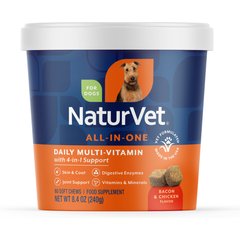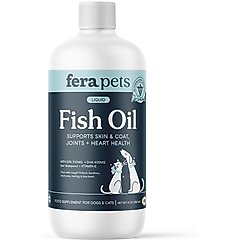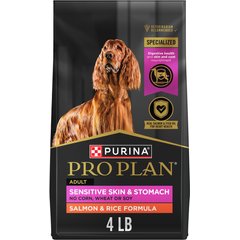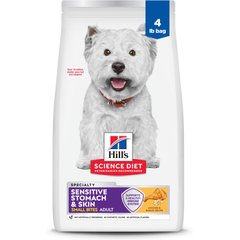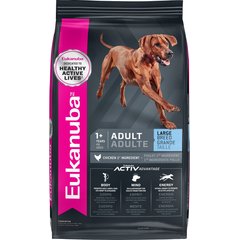What Is Vitamin E for Dogs?
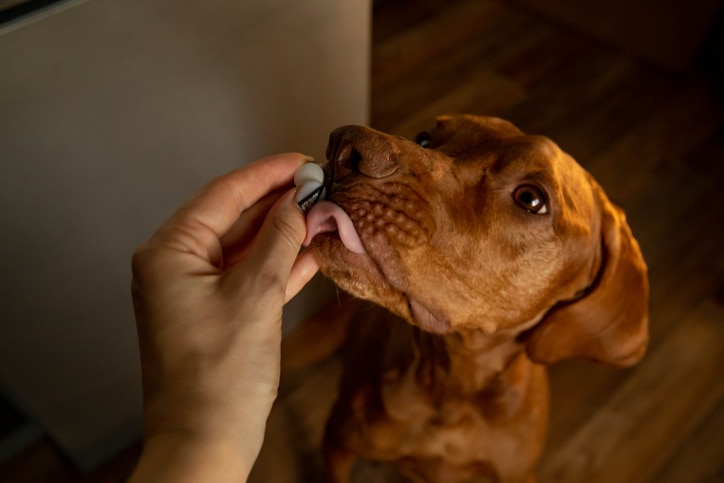
Photo by Stasya Yakovleva/iStock/Getty Images Plus
Vitamin E, also known as alpha-tocopherol or tocopherol, is an essential nutrient that helps keep dogs’ immune systems strong and their skin and coats healthy. Like multiple other vitamins, vitamin E is included in complete and balanced dog foods, generally making supplements unnecessary. However, some dogs may benefit from additional vitamin E in their diet.
We talked to veterinary experts to learn about vitamin E for dogs, including its benefits, signs of a deficiency, supplements, and more.
What Is Vitamin E?
Vitamin E is a fat-soluble vitamin that plays a key role as an antioxidant in the body and contributes to healthy skin and immune status, says Blaire Aldridge, MS, PhD, PAS, vice president of nutrition and innovation at BSM Partners, a pet food industry consulting firm in Aiken, South Carolina.
Think of antioxidants as tiny bodyguards inside your dog’s cells, she says. As your dog goes about their day, their body naturally produces unstable molecules known as free radicals, through normal processes like breathing and digestion.
Too many free radicals can damage cells, similar to how rust damages metal over time. But antioxidants like vitamin E neutralize free radicals before they potentially cause harm.
“This protection is especially important for your dog’s cells in organs, muscles, and the immune system,” Dr. Aldridge says.
Foods that are good sources of vitamin E include:
While these foods are rich in vitamin E, Dr. Aldridge says it isn’t generally necessary to supplement a dog’s diet with them. A high-quality, complete and balanced dog food will have sufficient levels of vitamin E for most pups.
Benefits of Vitamin E for Dogs
Vitamin E is a potent antioxidant that offers several health benefits to dogs. According to Dr. Aldridge and Sabrina Kong, DVM, certified canine rehabilitation practitioner at Jules Veterinary Center in Tracy, California, key benefits of vitamin E for dogs may include:
- Antioxidant protection
- Immune system support
- Skin health (promotes shiny coat)
- Reduced inflammation (helps with itching from allergies or dermatitis)
- Cellular repair
- Improved circulation
- Improved fertility
In 2024, researchers found both dogs and cats benefited from vitamin E in their diets with a concentration of about 1,000 international units (IU) per kilogram (kg) in the food. Pets fed a blend of vitamin E, vitamin C, and beta-carotene showed reduced signs of oxidation and decreased cellular breakdown, indicating improved immune health.
As with all other supplements, vitamin E should not be administered without your veterinarian’s approval.
Vitamin E Dosage for Dogs
It’s always best to consult your vet prior to giving vitamin E to your dog. They’ll determine whether supplements are necessary, and if so, share an appropriate dosage for your furry friend based on their individual needs.
The general recommended vitamin E dosage for dogs is 2–3 IU of vitamin E per pound of body weight daily, with a max of 400 IU/day for large dogs, Dr. Kong says.
The correct dosage of vitamin E for your dog will depend on their health and lifestyle factors such as age, activity level, diet, and whether they have health conditions like liver disease.
Vitamin E Deficiency in Dogs
Vitamin E deficiencies in dogs are rare and shouldn’t occur since commercially prepared pet foods are complete and balanced, Dr. Aldridge says.
However, there are some factors that can lead to a deficiency, such as:
- Feeding a homemade diet that isn’t formulated by a veterinary nutritionist and is not nutritionally balanced
- Feeding a diet high in fish oil or fish, which may lead to vitamin E stores depleting over time
- A medical malabsorption issue
- A genetic predisposition, as research has found in English Cocker Spaniels
Signs of vitamin E deficiency in dogs can include:
- Itching
- Flaky skin
- Rashes
- Reproductive issues
- Muscle weakness
Reach out to your vet if your dog shows these signs or other changes. If you notice inflamed skin patches or crusty areas on your dog, for example, this may warrant a visit to the vet, Dr. Aldridge says.
Best Vitamin E Supplements
Many vitamins and supplements for dogs can meet your canine companion’s unique needs. If they may benefit from additional vitamin E, Dr. Kong recommends opting for dog vitamin supplements in the form of soft gels or liquids. They’re also available as powders and soft chews.
Products that contain vitamin E include NaturVet all-in-one multivitamin and Fera Pets fish oil and vitamin E supplement.
Recommended Products
Avoid human supplements unless your vet approves them. Dr. Kong says they often contain additives that are poisonous to dogs, like xylitol.
Vitamin E Food for Dogs
According to the Association of American Feed Control Officials (AAFCO), dogs should eat pet food that contains at least 50 IU/kg of vitamin E daily.
Some dog foods have higher levels of vitamin E. If it’s a dry food, it may be guaranteed anywhere from 100–500 IU/kg, with higher levels aiming to combat cellular oxidative stress, Dr. Aldridge says.
A few dog foods that contain higher levels of vitamin E include Purina Pro Plan sensitive skin and stomach dog food, Hill’s Science Diet sensitive stomach and skin small breed dog food, and Eukanuba adult large breed dog food.
Recommended Products
You can always call and ask a company what their vitamin E level is in their food, or you may find a vitamin E guarantee on the package, Dr. Aldridge adds.
Consult your vet to get their recommendations on the best vitamin E food for your pooch before switching their diet.
FAQs About Vitamin E for Dogs
Q: Does vitamin E help with dog warts?
A: Maybe. While vitamin E isn’t a direct treatment for dog warts, its immune-boosting properties can support overall skin health during recovery, Dr. Kong says.
Q: Does vitamin E stop itching in dogs?
A: Yes, vitamin E can help ease itching from allergies or dermatitis in dogs.
Q: Does coconut oil contain vitamin E?
A: Yes, but coconut oil contains only trace vitamin E and is mostly rich in lauric acid, Dr. Kong says. Although coconut oil is safe in small doses (1 teaspoon per 10 pounds daily), it’s high in calories and not a reliable vitamin E source, she adds. It’s best to use it sparingly for coat shine, not as a supplement substitute.

